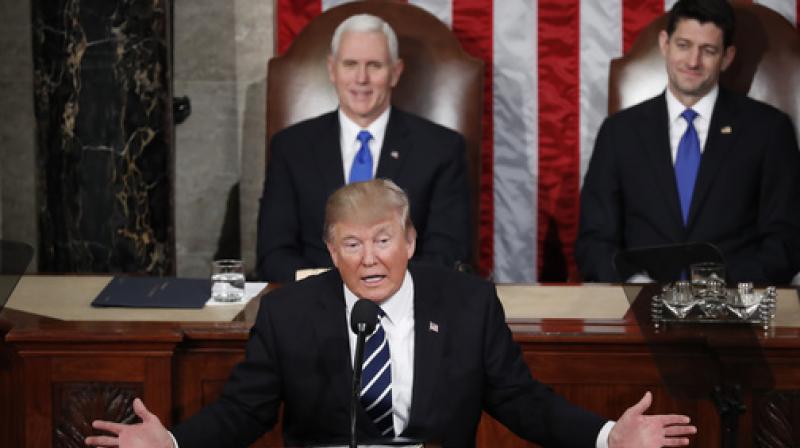Trump offers mixed messages on immigration

Washington: President Donald Trump, signalling a potential shift on a signature issue, indicated on Tuesday in a private meeting with news anchors that he's open to immigration legislation that would give legal status to some people living in the U.S. illegally and provide a pathway to citizenship to those brought to the U.S. illegally as children.
But hours later, in his first address to Congress, he pledged to vigorously target people living in the U.S. illegally who "threaten our communities" and prey on "innocent citizens." His private comments raised expectations that he might make a similar call in his primetime address. He hinted that he was open to legislation, saying that "real and positive immigration reform is possible," but still pledged to vigorously target those he says make the country unsafe.
The mixed messages underscore the thorniness of an issue that Republicans have been struggling to address for years and on which Trump appears to be torn.
The president, in a lunch with news anchors ahead of his address to Congress, said, "The time is right for an immigration bill as long as there is compromise on both sides." A person with knowledge of the discussion confirmed his comments to The Associated Press on the condition of anonymity.
In his address, Trump said he believes that "real and positive immigration reform is possible" and called on Republicans and Democrats to "work together to achieve an outcome that has eluded our country for decades."
But otherwise, he struck a different tone, touting the steps his administration has taken in its first month to crack down on people living in the country illegally and painting the image of a country besieged by "lawless chaos."
His administration, Trump said, has "answered the pleas of the American people for immigration enforcement and border security."
"As we speak, we are removing gang members, drug dealers and criminals that threaten our communities and prey on our very innocent citizens," he said. "Bad ones are going out as I speak tonight and as I promised throughout the campaign."
The message was underscored by the administration's decision to invite family members of people killed by immigrants living in the U.S. illegally to sit in first lady Melania Trump's box.
Trump campaigned as an immigration hard-liner, vowing to build a wall along the U.S.-Mexico border and pledging to step up deportations. Since taking office, some of his policy moves have hewed closely to those promises, including new guidance from the Department of Homeland Security that would subject any immigrant in the country illegally to deportation if they are charged or convicted of any offense, or even suspected of a crime.
But the president also has suggested he is open to finding a solution for the so-called Dreamers - those who were brought to the U.S. illegally as children. Although he railed against President Barack Obama's executive actions to protect those immigrants from deportation during the campaign, Trump has not rolled back those safeguards and has suggested he has other priorities.
During a White House news conference earlier this month, Trump said he would deal with the Dreamers with "great heart" but didn't say what his administration's policy would be. He called their status "one of the most difficult subjects I have, because you have these incredible kids."
Trump has flirted with a more lenient immigration policy before, saying during the campaign that he was open to "softening" his position. But he ultimately landed where he started, declaring during a speech in September that under his presidency, there would be "no legal status or becoming a citizen of the United States by illegally entering our country."
Congress last took up immigration legislation in 2013, after Hispanic voters overwhelmingly backed Obama in his re-election campaign. A measure including a pathway to citizenship passed the Senate, but stalled in the House.
The popularity of Trump's tough immigration message among Republican voters appeared to kill any prospect of taking up legislation during his tenure.
Senate Majority Leader Mitch McConnell said Tuesday that if Trump has an idea on immigration, "we'd be happy to take a look at it."
But immigration hard-liner Rep. Steve King of Iowa cautioned Trump against attempting to pursue comprehensive immigration legislation, calling it a "trap."
"Comprehensive is the code word for amnesty and everyone knows that by now," King said, arguing Trump needed to make good on his campaign promises including ending protections for the younger immigrants brought here illegally as kids. "If it's not going to be a promise kept on immigration the base will be gone."
On the other side, Rep. Bill Flores, R-Texas, argued that his conservative district and most of the country is ready for a solution on immigration that deals with the 11 million in the country illegally.
"I applaud the president for bringing this up," Flores said. "It's one of those areas where if you bring it up somebody's out there screaming the word amnesty at the top of their lungs and it's not amnesty, and so I think he's showed real leadership by bringing it up. I was thrilled to hear it."
As for the immigration hard-liners who've defeated past immigration efforts in the past, Flores said they didn't have Trump to contend with before.
"You've got a different president who can unleash Twitter jihad," Flores said.
Trump's mixed signals have left many, including Deyvid Morales, a 25-year-old Dreamer from Salt Lake City, unsure about their status. Morales, who has lived in the United States since 2001, said he was optimistic about the president's new comments but unsure if he could trust him, considering Trump's hardened rhetoric throughout the campaign.
"I believe about 20 percent of whatever he says," Morales said.

